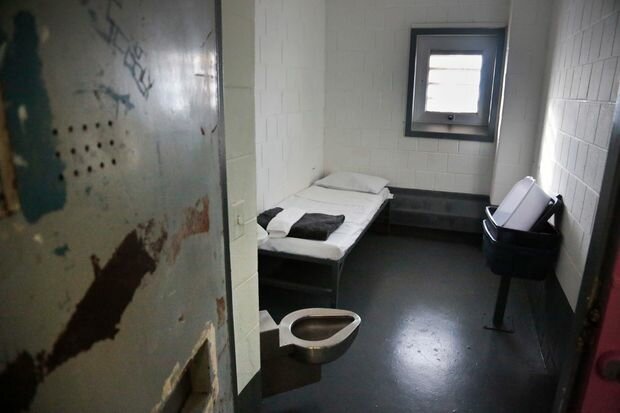
A solitary confinement cell at New York City’s Rikers Island jail. The city council is set to begin fast-tracking legislation this week to end the practice. PHOTO: BEBETO MATTHEWS/ASSOCIATED PRESS
By Rich Calder
Originally published on December 8, 2020 in the Wall Street Journal.
Nearly six months after Mayor Bill de Blasio pledged to end solitary confinement as a means of punishment in New York City’s jail system, the city council this week is set to begin fast-tracking the process by reviewing new legislation to halt the controversial practice.
Councilman Daniel Dromm, a Queens Democrat, is introducing a bill at Thursday’s council meeting that would prohibit inmates from being locked in an isolated cell for violent offenses—except for up to four hours whenever it is necessary to “de-escalate immediate conflict,” according to a review of the legislation.
Under current city law, solitary confinement, also known as punitive segregation, allows inmates to be locked in cells up to 20 hours a day for serious offenses.
“Solitary confinement is torture in the truer sense of the word,” Mr. Dromm said in an interview Tuesday. “Depriving people of human contact for long periods of time is un-American, and we shouldn’t be engaging in it.”
The city’s Department of Correction referred requests for comment to the mayor’s office.
Mr. De Blasio in June pledged to have New York become the first major city in the country to halt solitary confinement, and he set up a panel to come up with a plan, but it has yet to announce any recommendations.
Since he took office in 2014, the city’s jail system has significantly reduced its use of solitary confinement and the overall inmate population. As of Monday, there were 65 people in punitive segregation, compared with a daily average of 567 in 2014, according to the Department of Correction.
Mayoral spokeswoman Avery Cohen said in a statement that the mayor’s office is committed to ending punitive segregation and would “continue working with stakeholders in government and those with lived experience to create a system that ensures the safety and well-being of staff and people in custody.”
Punitive segregation has come under fire from criminal-justice advocates who say it’s inhumane. But law-enforcement advocates, including the Correction Officers’ Benevolent Association, the union representing city correction staff, say it is a necessary deterrent to keep violent inmates in line and jails safe.
On Friday, the council’s committee on criminal justice will hold a hearing on the bill, which Mr. Dromm believes has enough support to become law.
The prompt scheduling of the hearing by Council Speaker Corey Johnson, a Democrat, only a day after the bill’s scheduled introduction has raised concerns among some council members and the correction officers union. They say the legislation is being rushed into law for political reasons at the risk of endangering jail staff.
Historically, bills usually sit for weeks or months—and sometimes more than a year—before the council speaker’s office schedules a hearing to field testimony from city agencies and other affected parties.
Both Mr. Johnson and Councilman Keith Powers, a Manhattan Democrat who chairs the criminal justice committee, said they support ending solitary confinement.
“This bill is being heard because it’s ready and will continue to go through the legislative process,” a spokeswoman for Mr. Johnson said. “There’s nothing unusual about that.”
The legislation would still allow the city to keep detainees in other types of restrictive housing separated from a prison’s general population. Under the proposal, inmates in restrictive housing could leave their cells at least 10 hours a day, compared with 14 hours for a jail’s general population.
The city’s Rikers Island jail complex currently allows inmates in restrictive housing to leave cells for seven hours.
Six council members sent a letter to Johnson on Monday expressing “great concern regarding how quickly” the bill is getting a public hearing. The letter cited a series of recent attacks by inmates on correction officers.
“We firmly believe that rushing to pass a bill of this magnitude would have serious implications for the safety of our jails and could actually result in increased violence,” said the letter written by Robert Holden, a Queens Democrat, and cosigned by three Republicans and two other Democrats.
COBA President Benny Boscio Jr. accused Mr. Johnson of fast-tracking the bill into law in order to eclipse Mr. de Blasio politically on the issue.
“Speaker Corey Johnson is once again trying to beat the mayor in a race to ban punitive segregation entirely, which will only increase violent assaults on correction officers and non-violent inmates,” he said.
Read more here.
